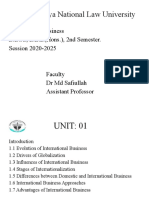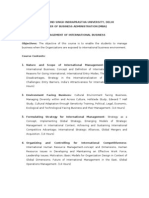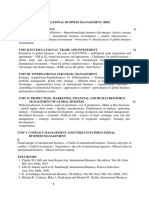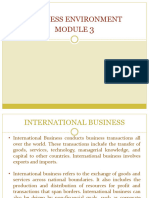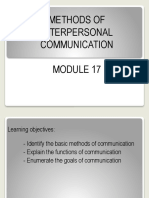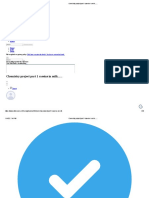MA 103. Module 1
MA 103. Module 1
Uploaded by
SamanthA AmoguisCopyright:
Available Formats
MA 103. Module 1
MA 103. Module 1
Uploaded by
SamanthA AmoguisOriginal Title
Copyright
Available Formats
Share this document
Did you find this document useful?
Is this content inappropriate?
Copyright:
Available Formats
MA 103. Module 1
MA 103. Module 1
Uploaded by
SamanthA AmoguisCopyright:
Available Formats
MA 103.
International Business and Trade MWF 9:30-10:30AM Instructor: Nueva Excija, Mona
Module 1: INTERNATIONAL BUSINESS – INTRODUCTION
EVOLUTION:
The origin of International Business goes back to human civilization. Sindh civilization had many
traces of having a trade relationship with the Eastern civilization. Later the concept of International
Business – a broader concept of integration of economies goes back to 19th century.
The first phase was took with the end of first World War in 1919. the import of raw materials by
colonial countries emperor from colonies and exporting them finished goods again to the colonies.
There is an increase in the level of international business.
But after second world war in 1945, the most of the colonial governments refused to export the
raw materials and import finished goods for the purpose of protecting the domestic companies. There
is a decrease in international business.
The consequences of World War II had made the world countries to feel the need of
international co-operation of global trade which led to the formation of various organizations like
International Monetary Fund (IMF) and International Bank for Reconstruction and
Development (IBRD), now called AS World Bank.
NATURE:
Globalization – is an attitude of mind – it is a mindset which views the entire world as a single
market so that the corporate strategy is based on the dynamics of global business environment. The
concept of globalization has filled up the concept of International business. In fact, the term
International Business was not popular before 2 decades. International Business is come from the word
International marketing and International Marketing is come from the word International Trade.
International Trade – International Marketing:
Originally, the producers used to export their products to the nearby countries and gradually extended
the export to far-off countries. Gradually the companies extended the operations beyond trade.
International Marketing – International Business:
The MNC’s which are producing in home country band marketing them in foreign countries, now
started locating their plants and other manufacturing facilities in foreign/ host countries. Later they
started producing in one country and marketing in other foreign countries.
A true global companies views the entire world as a single market. There is a great renovision, given by
Arvindh Mills:
❖ Source raw material wherever they are cheapest.
❖ Manufacture wherever in the world is most cost effective.
❖ Sell in those markets where the prices are highest.
❖ Raise finance globally.
❖ ‘forge international strategy alliance.
❖ To manage all these, take the best talent from all over the world.
And you will have achieved the stature of a true multinational.
MEANING:
International Business refers to the exchange of goods and services between two parties of different
countries.
International Business may be understood as those business transactions involve crossing of national
boundaries.
International Business is the process of focusing on the resources of the globe and objectives of the
organization on the global business opportunities and threats in order to produce/buy/sell or exchange
of goods and services worldwide.
Reference: International Business by Navya S. Murthy
FEATURES:
1. Large Scale Operations:
2. Integration of Economies:
3. Dominated by developed countries and MNC’s
4. Benefits to Participating countries:
5. Keen Competition:
6. Special role of science and technology:
7. International Restrictions:
8. Sensitive Nature:
9. Accurate information
10. Timely information.
11. Geographic market segment.
REASONS FOR THE EMERGENCE OF INTERNATIONAL BUSINESS:
• To achieve higher rate of profits
• Expanding the production capacity
• Severe competition in home country
• Limited home market
• Political Stability v/s Political Instability
• Availability of Technology and Managerial Competency
• High cost of transportation
• Nearness to Raw materials
• Availability of Quality HR at less cost
• Liberalization and Globalization
• To increase market share
• To achieve higher rate of economic development
STAGES OF INTERNATIONALISATION:
Every company in the International Business will pass through the 5 different stages of
Internationalization. They are:
1) Domestic Company
2) International Company
3) Multi-National Company
4) Global Company
5) Transnational Company
APPROACHES TO INTERNATIONAL BUSINESS:
Douglas Wind and Pelmutter advocated four approaches of International Business. They are:
▪ Ethnocentric Approach
▪ Polycentric Approach
▪ Regiocentric Approach
▪ Geocentric Approach
Reference: International Business by Navya S. Murthy
You might also like
- Solved Problems On Semiconductor DiodeDocument8 pagesSolved Problems On Semiconductor DiodeAravind Karthik100% (2)
- International BusinessDocument124 pagesInternational BusinessAamna MunaimaNo ratings yet
- ZXR10 M6000 Carrier-Class Router Product DescriptionDocument110 pagesZXR10 M6000 Carrier-Class Router Product DescriptionHarishNo ratings yet
- Mba 303: International Business Management Unit I: Concept of International Business: Stages of Internationalization - International EconomicDocument33 pagesMba 303: International Business Management Unit I: Concept of International Business: Stages of Internationalization - International EconomicBakka VennelaNo ratings yet
- Study On IbDocument66 pagesStudy On Ibvishnudath709No ratings yet
- International BusinessDocument51 pagesInternational BusinessDARSHAN CHAVANNo ratings yet
- IBT Module 1Document5 pagesIBT Module 1bernardita.nobibNo ratings yet
- BU IHRM - IntroductionDocument9 pagesBU IHRM - IntroductionVishnu NairNo ratings yet
- International Business,: Dr.S.Krishna Kumar Wish You A Very Happy Academic YearDocument40 pagesInternational Business,: Dr.S.Krishna Kumar Wish You A Very Happy Academic Yearmnjbash100% (1)
- MIB For IPDocument210 pagesMIB For IPaditya_kpl588% (8)
- Lecture 1 RevisedDocument23 pagesLecture 1 RevisedRohit GuptaNo ratings yet
- IB - Unit-3Document44 pagesIB - Unit-3manjari2839No ratings yet
- Unit : - International Business An OverviewDocument9 pagesUnit : - International Business An Overviewyashgupta31012011No ratings yet
- Introduction To International Business and The Rise of GlobalizationDocument25 pagesIntroduction To International Business and The Rise of GlobalizationBernadette Ruiz AlbinoNo ratings yet
- Ibm - Full Unit NotesDocument158 pagesIbm - Full Unit NotesHaripriya VNo ratings yet
- Features of International BusinessDocument26 pagesFeatures of International BusinessfranklinNo ratings yet
- International BusinessDocument36 pagesInternational BusinessHJ ManviNo ratings yet
- Chapter 1 - INTRODUCTION TO INTERNATIONAL BUSINESSDocument8 pagesChapter 1 - INTRODUCTION TO INTERNATIONAL BUSINESSCherrymae TangapanNo ratings yet
- International Business Final NotesDocument16 pagesInternational Business Final NotesShwetha SiddaramuNo ratings yet
- Unit 01 - International MarketingDocument28 pagesUnit 01 - International MarketingRhythm chordiaNo ratings yet
- Manmgt3 1 PDFDocument29 pagesManmgt3 1 PDFWilsonNo ratings yet
- BE Unit 3Document43 pagesBE Unit 3Kiran BendeNo ratings yet
- Advantages and Disadvantages of International TradeDocument8 pagesAdvantages and Disadvantages of International TradeNainesh Pandare100% (2)
- Business Environment Global Market and WTODocument19 pagesBusiness Environment Global Market and WTOAryanNo ratings yet
- International BusinessDocument26 pagesInternational BusinessSamrà KhanNo ratings yet
- Module 1 International Marketing Notes Amity UniversityDocument7 pagesModule 1 International Marketing Notes Amity Universityrohan_jangid8No ratings yet
- International BusinessDocument109 pagesInternational Businesskarthikpranesh7No ratings yet
- International Business NotesDocument143 pagesInternational Business Notesdevil hNo ratings yet
- Bba Glo Mark.Document90 pagesBba Glo Mark.aniketpandey923No ratings yet
- BusinessDocument73 pagesBusinessLightNo ratings yet
- CH 1 Busi1701Document7 pagesCH 1 Busi1701mmshab24No ratings yet
- Ibm Notes For ReferenceDocument156 pagesIbm Notes For ReferencePravitha SajeeNo ratings yet
- International Business Class 1: Intro & Globalization: Shyamala SethuramDocument36 pagesInternational Business Class 1: Intro & Globalization: Shyamala SethuramHernan OchoaNo ratings yet
- International Business Lecture 1Document13 pagesInternational Business Lecture 1Lillian KobusingyeNo ratings yet
- GlobalizationDocument34 pagesGlobalizationHanan SherazNo ratings yet
- IB Notes - Unit - 1Document17 pagesIB Notes - Unit - 1b639322No ratings yet
- International MarketingDocument40 pagesInternational MarketingThanga DuraiNo ratings yet
- Intl Markt Product Launch FinalDocument24 pagesIntl Markt Product Launch FinalvikasmisarNo ratings yet
- Module 1Document9 pagesModule 1Parag PimpalghareNo ratings yet
- Class WorkDocument58 pagesClass WorkZain AliNo ratings yet
- GlobalizationDocument9 pagesGlobalizationMa. Patricia Lainne TorresNo ratings yet
- Chapter 1-Int' Business and GlobalizationDocument30 pagesChapter 1-Int' Business and GlobalizationAddiNo ratings yet
- International Business Chapter-1Document19 pagesInternational Business Chapter-1Shwetha SiddaramuNo ratings yet
- International Business Management: Unit 1Document13 pagesInternational Business Management: Unit 1thejeshwarNo ratings yet
- Important Questions For International Marketing Internals 2Document4 pagesImportant Questions For International Marketing Internals 2krish mastramNo ratings yet
- Multinational Corporations (MNC'S) : Business OrganizationDocument42 pagesMultinational Corporations (MNC'S) : Business OrganizationAmit bailwalNo ratings yet
- Elec 4 Prelim ReviewerDocument5 pagesElec 4 Prelim Reviewerfujiko galboNo ratings yet
- Wa0000.Document26 pagesWa0000.Sammo AhmedNo ratings yet
- IB NotesDocument53 pagesIB Notesshobhit parasharNo ratings yet
- Introduction To GlobalizationDocument6 pagesIntroduction To GlobalizationGiralph NikkoNo ratings yet
- Global BusinessDocument73 pagesGlobal Businessmanan chachraNo ratings yet
- Unit I: International Business Is Defined As Commercial Transactions That Occur Across CountryDocument42 pagesUnit I: International Business Is Defined As Commercial Transactions That Occur Across CountryreenaimandiNo ratings yet
- DMGT545 International Business PDFDocument305 pagesDMGT545 International Business PDFNithyananda PatelNo ratings yet
- (Chapter 1) What Is International BusinessDocument73 pages(Chapter 1) What Is International BusinessPatrice MarandaNo ratings yet
- Global Business Management Master 1 InuscastyDocument15 pagesGlobal Business Management Master 1 Inuscastykacheuyann7No ratings yet
- Course International MarketingDocument93 pagesCourse International MarketingManik SinghNo ratings yet
- A Presentation BY Prof. Pawan K. Chugan Institute of Management Nirma University AhmedabadDocument43 pagesA Presentation BY Prof. Pawan K. Chugan Institute of Management Nirma University Ahmedabadshivam saraffNo ratings yet
- Master of Business Administration-MBA Semester 4 MB0053 - International Business ManagementDocument8 pagesMaster of Business Administration-MBA Semester 4 MB0053 - International Business ManagementRahul MhetreNo ratings yet
- The Future of Global Trade: Trends and Opportunities in Export-ImportFrom EverandThe Future of Global Trade: Trends and Opportunities in Export-ImportNo ratings yet
- General Provisions Article 1767 1768Document219 pagesGeneral Provisions Article 1767 1768SamanthA AmoguisNo ratings yet
- 2 Courses Enrolled at USTDocument3 pages2 Courses Enrolled at USTSamanthA AmoguisNo ratings yet
- Module-13Document9 pagesModule-13SamanthA AmoguisNo ratings yet
- Module-17Document9 pagesModule-17SamanthA AmoguisNo ratings yet
- Module-16Document10 pagesModule-16SamanthA AmoguisNo ratings yet
- Principles of DesignDocument17 pagesPrinciples of DesignSamanthA AmoguisNo ratings yet
- Module-18Document16 pagesModule-18SamanthA AmoguisNo ratings yet
- Models of CommunicationDocument7 pagesModels of CommunicationSamanthA AmoguisNo ratings yet
- Crystalpunk Playtest 1 - The EvolutionistDocument12 pagesCrystalpunk Playtest 1 - The EvolutionistRayar32No ratings yet
- Before 1930 1. Law of Readiness - Proposed in His Book Entitled The Original Nature of ManDocument7 pagesBefore 1930 1. Law of Readiness - Proposed in His Book Entitled The Original Nature of ManJessNo ratings yet
- What Is Abac, Rbac, EtcDocument12 pagesWhat Is Abac, Rbac, EtcvinimollNo ratings yet
- Chapter 1 Chart Pattern SecretDocument18 pagesChapter 1 Chart Pattern SecretorderterimakasihNo ratings yet
- Cem103 Lecture 2 Cost Estimating ComponentsDocument16 pagesCem103 Lecture 2 Cost Estimating ComponentsMrSamspart100% (1)
- Mumbai Suburban Serial Blast CaseDocument11 pagesMumbai Suburban Serial Blast CaseunLAWk IndiaNo ratings yet
- Substantial Completion CertificateDocument1 pageSubstantial Completion CertificateAnungNugalabNo ratings yet
- Logistic Regression Course NoteDocument23 pagesLogistic Regression Course NoteHOD ODNo ratings yet
- Kickstart Lesson Plan Writing in RoleDocument3 pagesKickstart Lesson Plan Writing in Roleapi-351188250No ratings yet
- Title - Study and Analysis of The Effects of Waves and Wind On Offshore Structures and Marine VesselsDocument5 pagesTitle - Study and Analysis of The Effects of Waves and Wind On Offshore Structures and Marine VesselsIszysax MediaNo ratings yet
- JS-Registration-FINAL EDITDocument1 pageJS-Registration-FINAL EDITRigel PacisNo ratings yet
- KR-301 ControlDocument16 pagesKR-301 ControlSreekanthMylavarapuNo ratings yet
- CarDekho Proforma InvoiceDocument1 pageCarDekho Proforma Invoicesnm.kartickNo ratings yet
- D2961800 D3DJ4327 D3DJ4130 D3DJ4326 D3DJ4322 D3DJ4323Document3 pagesD2961800 D3DJ4327 D3DJ4130 D3DJ4326 D3DJ4322 D3DJ4323italo PGLNo ratings yet
- Chemistry Project Part 1 Caseins in Milk.....Document38 pagesChemistry Project Part 1 Caseins in Milk.....prem malviNo ratings yet
- Exercise 2: Venipuncture Using Vacuum Collection System: ObjectivesDocument28 pagesExercise 2: Venipuncture Using Vacuum Collection System: ObjectivesFrieda CayabyabNo ratings yet
- Digital Transmission: Solutions To Review Questions and ExercisesDocument11 pagesDigital Transmission: Solutions To Review Questions and ExercisesAq RaufNo ratings yet
- Updated Question Bank-5Document7 pagesUpdated Question Bank-5Dr. Sushant ShekharNo ratings yet
- Alumni Feedback FormDocument1 pageAlumni Feedback FormPranali ShethNo ratings yet
- Ann Masiker-Angel Virtues HAEAV-097 JoyDocument17 pagesAnn Masiker-Angel Virtues HAEAV-097 Joyvyarageorgieva1313No ratings yet
- OECD Test Guideline 109 Yoğunluk StandartDocument5 pagesOECD Test Guideline 109 Yoğunluk StandartnilayNo ratings yet
- Objectives of Inventory ManagementDocument4 pagesObjectives of Inventory ManagementPfritz SollestaNo ratings yet
- Aba RubricsDocument3 pagesAba RubricsAbraham BojosNo ratings yet
- RetailCo 2 Case AnalysisDocument5 pagesRetailCo 2 Case AnalysisDino De LeonNo ratings yet
- GizzzzzDocument18 pagesGizzzzzAdinaan ShaafiiNo ratings yet
- Exercise Session 9 SolutionsDocument14 pagesExercise Session 9 Solutionsrivoge7568No ratings yet
- Lisa Martin - Augmentative and Alternative Communication - EnglishDocument37 pagesLisa Martin - Augmentative and Alternative Communication - EnglishGlobalDownSyndromeNo ratings yet
- Simulation of Cold Forming of A Steel Union at DA-TOR S.p.A.Document4 pagesSimulation of Cold Forming of A Steel Union at DA-TOR S.p.A.stefanomazzalaiNo ratings yet

